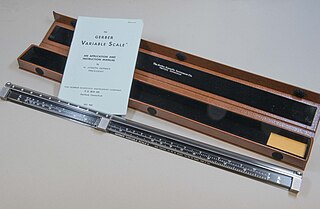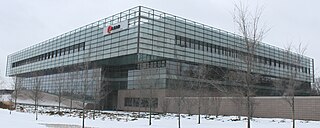
Computer-aided design (CAD) is the use of computers to aid in the creation, modification, analysis, or optimization of a design. This software is used to increase the productivity of the designer, improve the quality of design, improve communications through documentation, and to create a database for manufacturing. Designs made through CAD software help protect products and inventions when used in patent applications. CAD output is often in the form of electronic files for print, machining, or other manufacturing operations. The terms computer-aided drafting (CAD) and computer-aided design and drafting (CADD) are also used.

CATIA is a multi-platform software suite for computer-aided design (CAD), computer-aided manufacturing (CAM), computer-aided engineering (CAE), 3D modeling and product lifecycle management (PLM), developed by the French company Dassault Systèmes.

In industry, product lifecycle management (PLM) is the process of managing the entire lifecycle of a product from its inception through the engineering, design and manufacture, as well as the service and disposal of manufactured products. PLM integrates people, data, processes, and business systems and provides a product information backbone for companies and their extended enterprises.
Product data management (PDM) is the name of a business function within product lifecycle management (PLM) that denotes the management and publication of product data. In software engineering, this is known as version control. The goals of product data management include ensuring all stakeholders share a common understanding, that confusion during the execution of the processes is minimized, and that the highest standards of quality controls are maintained. PDM should not be confused with product information management (PIM).

PTC Inc. is an American computer software and services company founded in 1985 and headquartered in Boston, Massachusetts. The company was a pioneer in parametric, associative feature-based, solid computer-aided design (CAD) modeling software in 1988, including an Internet-based product for Product Lifecycle Management (PLM) in 1998. PTC markets products and services and an Internet of Things (IoT) and augmented reality (AR) platform for partners and developers.

Gerber Scientific Inc., is a parent company headquartered in Tolland, Connecticut, USA. It supplies software and hardware systems for apparel and technical textiles, sign-making and specialty graphics, and composites and packaging applications.

Lear Corporation is an American company that manufactures automotive seating and automotive electrical systems. In 2019, it ranked #147 and in 2018, it ranked #148 on the Fortune 500 list.

Alcantara is the brand name of a synthetic textile with a soft, suede-like microfibre pile, noted for its durability. Alcantara was developed in the 1970s by Miyoshi Okamoto and initially manufactured by the Italian company Alcantara. The term has an Arabic root and means "the bridge".
Altium Limited is an American multinational software company that provides electronic design automation software to engineers who design printed circuit boards. Founded as Protel Systems Pty Ltd in Australia in 1985, the company has regional headquarters in the United States, Australia, China, Europe, and Japan. Its products are designed for use in a Microsoft Windows environment and used in industries such as automotive, aerospace, defence and telecommunications. Its flagship product, Altium Designer, is a software for unified electronics design. Since August 2024, Altium is a subsidiary of Renesas Electronics.
Heinz Joseph Gerber was an American inventor and businessman. An Austrian-born Jewish Holocaust survivor who immigrated in 1940, he pioneered computer-automated manufacturing systems for an array of industries. Described as the "Thomas Edison of manufacturing", he was one of the first to recognize and develop the productivity-enhancing potential for computer automation in skill-intensive industrial sectors.
Cimatron is an Israeli software company that produces CAD/CAM software for manufacturing, toolmaking and CNC programming applications.

CD-adapco was a multinational computer software company that authored and distributed applications used for computer-aided engineering, best known for its computational fluid dynamics (CFD) products. In 2016 the company was acquired by Siemens Digital Industries Software.

WorkNC is a computer-aided manufacturing (CAM) software developed by Sescoi for multi-axis machining.
NX, formerly known as "Unigraphics", is an advanced high-end CAD/CAM/CAE, which has been owned since 2007 by Siemens Digital Industries Software. In 2000, Unigraphics purchased SDRC I-DEAS and began an effort to integrate aspects of both software packages into a single product which became Unigraphics NX or NX.

UGS was a computer software company headquartered in Plano, Texas, specializing in 3D & 2D Product Lifecycle Management (PLM) software. Its operations were amalgamated into the Siemens Digital Industries Software business unit of Siemens Industry Automation division, when Siemens completed the US$3.5 billion acquisition of UGS on May 7, 2007.
Siemens Digital Industries Software is an American computer software company specializing in 3D & 2D Product Lifecycle Management (PLM) software. The company is a business unit of Siemens, operates under the legal name of Siemens Industry Software Inc, and is headquartered in Plano, Texas.
PTC Windchill is a family of Product Lifecycle Management (PLM) software products that is offered by PTC. In 2004, as part of their expansion in the area of collaboration tools, they arranged having "a hosted version of Windchill to small- and medium-sized customers." As of 2011, products from its marketer, PTC, were being used by over 1.1 million users worldwide.

C3D Toolkit is a proprietary cross-platform geometric modeling kit software developed by Russian C3D Labs. It's written in C++. It can be licensed by other companies for use in their 3D computer graphics software products. The most widely known software in which C3D Toolkit is typically used are computer aided design (CAD), computer-aided manufacturing (CAM), and computer-aided engineering (CAE) systems.
Bahauddin Zakariya University College of Textile Engineering, also known as BZU college of textile engineering, is an institute in southern Punjab, which provides engineering degrees in the field of textile. It is situated on 6-km Khanewal road in Multan, Pakistan.











